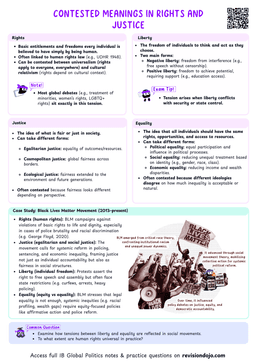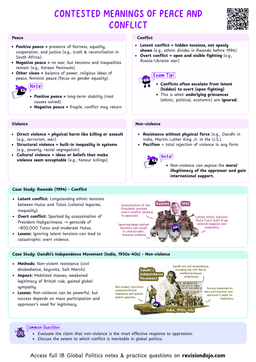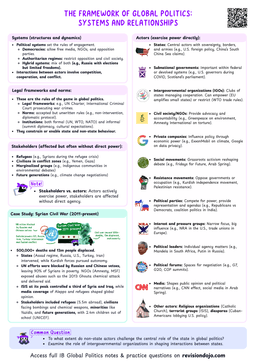Understanding Non-State Actors
Non-state actors
Non-state actors (NSAs) are entities that operate independently of state control.
- Non-Governmental Organizations (NGOs):
- Example: Amnesty International, which advocates for human rights globally.
- Multinational Corporations (MNCs):
- Example: Apple, influencing global supply chains and labor practices.
- Terrorist Groups:
- Example: Al-Qaeda, challenging state security and sovereignty.
- International Organizations:
- Example: The United Nations, though state-driven, often acts independently in humanitarian crises.
- Social Movements:
- Example: Black Lives Matter, advocating for racial justice and policy change.
- The legitimacy of NSAs is often contested, as they lack the formal authority of states but can wield significant influence in global politics.
Defining Legitimacy
Legitimacy refers to the perceived right of an actor to exercise power or influence. It is based on:
- Moral Authority:
- Does the actor align with ethical principles or human rights?
- Effectiveness:
- Does the actor achieve its goals or provide valuable services?
- Recognition:
- Is the actor acknowledged by states, international organizations, or the public?
- When analyzing the legitimacy of NSAs, consider how their actions align with global norms, such as human rights, environmental sustainability, or economic justice.
Factors Influencing the Legitimacy of Non-State Actors
1. Alignment with Global Norms
- Human Rights Advocacy:
- NGOs like Human Rights Watch gain legitimacy by promoting universal human rights.
- Environmental Sustainability:
- Organizations like Greenpeace are seen as legitimate for their efforts to combat climate change.
- The 2015 Paris Climate Agreement was heavily influenced by NSAs, including environmental NGOs and MNCs, highlighting their role in shaping global policy.
2. Effectiveness and Impact
- Service Delivery:
- NGOs providing humanitarian aid in conflict zones, such as Médecins Sans Frontières, gain legitimacy through their effectiveness.
- Economic Influence:
- MNCs like Google shape global technology standards, though their legitimacy may be questioned if they evade taxes or exploit labor.
- Effectiveness can be a double-edged sword.
- While it enhances legitimacy, failures or negative impacts can undermine it.
3. Recognition by States and International Organizations
- Partnerships:
- NSAs working with the UN or governments often gain legitimacy through formal recognition.
- Legal Status:
- Some NSAs, like the International Committee of the Red Cross, have special legal status under international law.
- Students often assume that all NSAs are inherently legitimate if they align with positive causes.
- Remember that legitimacy is context-dependent and can be contested.
4. Transparency and Accountability
- Transparency:
- NSAs that disclose their funding sources and decision-making processes are often seen as more legitimate.
- Accountability:
- Mechanisms for accountability, such as independent audits or stakeholder consultations, enhance legitimacy.
- Identify three factors that influence the legitimacy of non-state actors.
- How do these factors apply to a specific NSA you are familiar with?
Challenges to the Legitimacy of Non-State Actors
1. Lack of Democratic Accountability
- Unelected Leadership:
- Many NSAs are not democratically elected, raising questions about their representativeness.
- Decision-Making Processes:
- Some NSAs, like MNCs, prioritize profit over public interest, undermining their legitimacy.
- To what extent does legitimacy depend on democratic processes?
- How might this vary across different cultural or political contexts?
2. Conflicting Interests
- MNCs and Profit Motives:
- Companies like Amazon face criticism for labor practices, despite their economic contributions.
- NGOs and Political Agendas:
- Some NGOs are accused of promoting Western values, leading to resistance in certain regions.
- The Bill & Melinda Gates Foundation is praised for its global health initiatives but criticized for its influence on public policy without democratic oversight.
3. Ethical Concerns
- Terrorist Groups:
- While some may claim legitimacy based on ideological or religious grounds, their use of violence undermines broader acceptance.
- Corruption and Mismanagement:
- NSAs involved in scandals, such as misuse of funds, lose legitimacy.
- Legitimacy is not static.
- It can evolve over time based on an actor's actions, external perceptions, and changing global norms.
Case Studies: Legitimacy in Action
1. Amnesty International
- Legitimacy Factors:
- Moral Authority: Advocates for human rights globally.
- Effectiveness: Influences policy through research and advocacy.
- Challenges: Criticized for perceived bias or lack of focus on certain regions.
- Amnesty International's 2019 report on Saudi Arabia's human rights abuses led to international pressure on the Saudi government, demonstrating the NGO's influence and legitimacy.
2. Facebook (Meta)
- Legitimacy Factors:
- Economic Influence: Dominates global social media.
- Challenges: Criticized for data privacy issues and spreading misinformation.
- Response: Efforts to improve transparency and accountability, such as independent oversight boards.
- The legitimacy of NSAs is often context-specific.
- An actor may be seen as legitimate in one region or issue area but not in another.
The Broader Implications of NSA Legitimacy
- Global Governance:
- NSAs play a crucial role in addressing transnational issues like climate change, human rights, and global health.
- Challenges to State Sovereignty:
- The rise of NSAs can undermine traditional state authority, leading to tensions in international relations.
- Evolving Norms:
- The legitimacy of NSAs reflects broader shifts in global norms, such as the increasing emphasis on human rights and sustainability.
- Reflect on a non-state actor you are familiar with.
- What factors contribute to its legitimacy or lack thereof?
- How does this influence its role in global politics?


